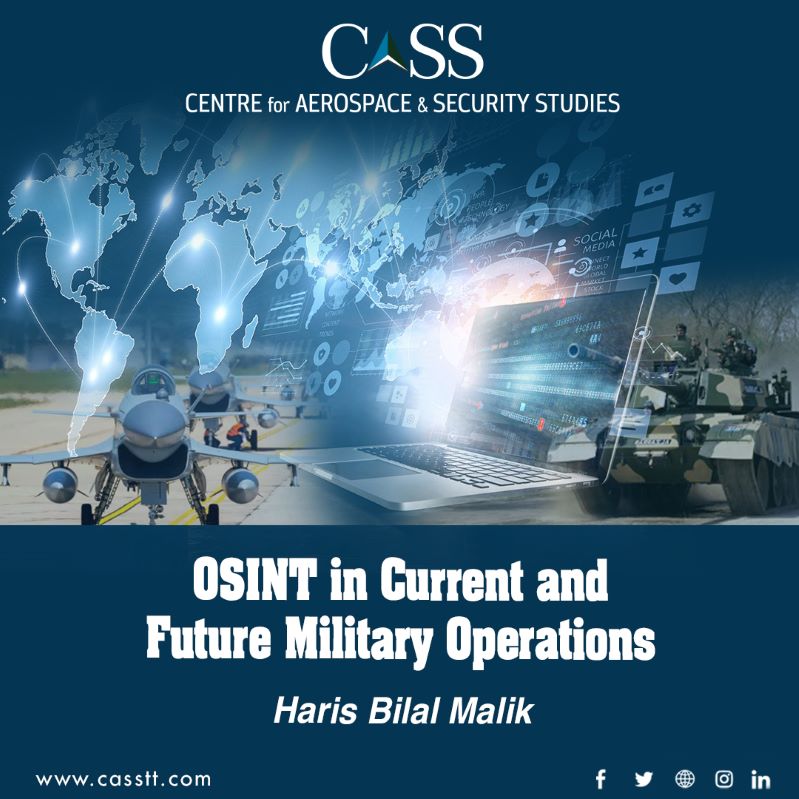In recent years, the international security environment has evolved in a way that lays greater emphasis on information gathering and analysis. This is largely due to the proliferation of digital technologies and the internet, which have made it easier for individuals, organisations, and governments to access, share, and disseminate information. As a result, the traditional concept of ‘national security’ has expanded to include cyber security, information security, and online propaganda.
In this context, ‘Open-Source Intelligence’ (OSINT) has emerged as an important tool and resource for governments, militaries, intelligence organisations, and individuals. It refers to information that is publicly available and can be collected from a wide range of sources, including the internet, social media, newspapers, and government websites.
The rise of information warfare and the need for intelligence on digital fronts has made OSINT an even more crucial resource for organisations dealing with the national security of a state. Various examples and case studies show it can provide valuable information that can be used to make informed decisions about foreign policy, intelligence operations, and military strategy; understand and respond to global security threats; support military operations; and gain a deeper understanding of conflicts. By analysing data from various sources such as social media, online forums, and satellite imagery, OSINT analysts can gain a better understanding of movements and activities in conflict areas. For instance, the US military used OSINT to track and monitor the Islamic State of Iraq and Syria (ISIS), through information on the location, movements, and activities of ISIS leaders and fighters, as well as its financial and logistical networks. Thereby, becoming a true force multiplier.
Not only this, OSINT can be used to monitor and counter disinformation, propaganda, and misinformation, which are widely used by state and non-state actors to influence public opinion and political decisions. The ongoing Russia-Ukraine War, characterised by a high degree of disinformation and propaganda on both sides, is also a case study of OSINT. One of the key aspects of OSINT in this war has been the use of social media. Social media platforms such as Twitter, Facebook, and YouTube have been used to disseminate information by the warring parties. OSINT analysts have been able to use these platforms to track the movement of troops, equipment, and weapons. They have also been able to identify and track individuals and organisations that have been involved in the conflict. Besides social media, another important aspect of OSINT in the Russia-Ukraine War is the use of satellite imagery. Analysts on both sides have been able to use satellite imagery to accurately track the movement of troops and equipment, as well as to identify and track changes in the terrain. OSINT specialists have also been able to track the flow of money to different groups and individuals involved in the conflict, which has helped to identify potential sources of funding for the war.
Since OSINT allows for the collection of information from a wide variety of sources, it enables a more comprehensive understanding of the situation on the ground, while also allowing for cross-referencing and verification of the information. Another advantage of OSINT is that it is relatively low cost and accessible to a wide range of individuals and organisations. This has enabled a diverse group of actors, including journalists, researchers, and analysts, to play an active role in monitoring and analysing conflicts worldwide.
Despite these advantages, it is important to note that OSINT is not without its limitations. The information collected from open sources may be incomplete, biased, or even deliberately misleading. It is also important to be aware of ‘information pollution’ where a large amount of false or misleading information is spread deliberately to confuse or mislead.
In short, OSINT has become increasingly relevant in today’s strategic environment due to the abundance of open-source information. As conflicts become more complex and globalised, it is essential for governments, military organisations, and other stakeholders to have access to accurate and timely information in order to make informed decisions in a variety of fields, including cyber security, intelligence, surveillance, and national security. As the world becomes more interconnected and the amount of publicly available information continues to grow, the use of OSINT is likely to assume a critical role alongside traditional means of intelligence gathering.
Haris Bilal Malik is a Research Assistant at the Centre for Aerospace & Security Studies (CASS), Islamabad, Pakistan. The article was first published in Modern Diplomacy. He can be reached at cass.thinkers@casstt.com




